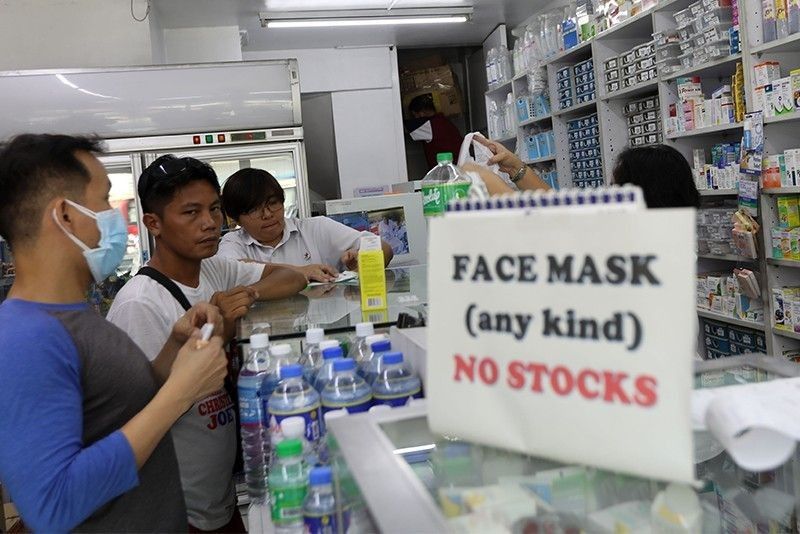COMMENTARY: Community pharmacists can help curb COVID-19 spread

MANILA, Philippines — President Rodrigo Duterte has declared the COVID-19 outbreak in the country a nationwide state of public health emergency following an increased number of cases, two of whom have been identified as local transmissions.
Because of their accessibility to the general public, pharmacies serve as the first point of contact for medical servies. This gives community pharmacists critical roles not only in answering health-related inquiries and addressing false and misleading information about the outbreak but also assuring customers that the best way to protect themselves is through prevention.
Pharmacists may provide life-saving preventive measures such as practical demonstrations of respiratory/cough etiquette, hand hygiene, and social distancing—including food safety measures and environmental measures such as cleaning frequently touched objects and surfaces.
Preventing shortages
As the outbreak situation evolves quickly, consumers have been rushing to purchase supplies, which may lead to shortages and could put people's health at risk, especially those with special needs or pre-existing medical conditions.
Pharmacists help prevent shortages and overpricing by ensuring pharmacy products such as facemasks and hand sanitizers are in stock.
Aside from working closely with suppliers to meet customer needs, pharmacists may also consider alternatives such as putting a limit on how many of a product a customer can buy to make sure others can get supplies too.
Advising customers about the proper use of a facemask is also vital to prevent shortages. This is achieved by emphasizing that facemasks sohuld be reserved for health workers, caretakers, and individuals with respiratory symptoms, such as fever and cough.
To refrain from unnecessary and excessive use of hand sanitizers, pharmacists may also introduce to customers new greeting habits to reduce the risk of contracting and spreading the coronavirus.
While some have adopted the “Wuhan Shake”, where people tap their feet instead of shaking hands, pharmacists could follow the handshake alternatives shared by Dr. Sylvie Briand, the Director of Pandemic and Epidemic Diseases Department at the World Health Organization which include the "wave," the Thai "wai," and the "elbow.”
While there are no approved treatments and vaccines for COVID-19 yet, the World Health Health Organization recommends that people affected should receive proper care to relieve symptoms and that those with serious illness should be hospitalized. The WHO reports that most patients recover because of supportive care.
While medical experts are still learning about how COVID-19 affects people, pharmacists may advise that older persons and persons with pre-existing medical conditions (such as high blood pressure, heart disease, lung disease, cancer or diabetes) should take extra care as data suggests they are more vulnerable.
Spotting potential COVID-19 patients
It is also vital that pharmacists emphasize to costumers that antibiotics do not work against COVID-19, which is caused by a virus, since antibiotics only work against bacteria and should only be used as prescribed by a doctor.
In line with medication preparedness, pharmacists may also advise people to have common non-prescription medicines for cold, fever, and allergies on hand. In addition, people who are taking maintenance medication should make sure that their prescriptions are up to date.
As trained healthcare professionals, pharmacists can identify potential cases of COVID-19 during a customer visit to the drugstore.
In this situation, it is the pharmacist's obligation to report potential cases immediately to health protection authorities such as the Barangay Health Emergency Response Team (BHERT), Municipal Health Officer (MHO)/City Health Officer (CHO), Local Surveillance Officer, and Regional Epidemiology and Surveillance Unit (RESU) for transport to nearest appropriate healthcare facility.
To boost cooperation, pharmacists may encourage suspected persons and reassure them that it is for their own good and the good of the the people around them, especially their loved ones.
It is also important that pharmacists encourage citizens to use credible sources of information such as the official website and social media accounts of the Department of Health, the WHO, and the US Centers for Disease Control and Prevention.
Teresa May Bandiola, 29, is a licensed pharmacist, a published writer, and a university instructor at the School of Pharmacy of Far Eastern University-Nicanor Reyes Medical Foundation.
- Latest






























